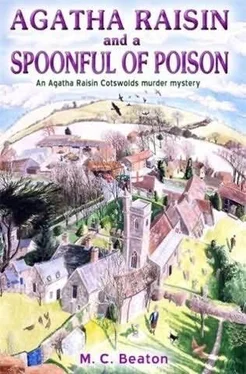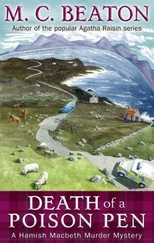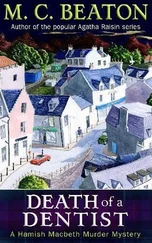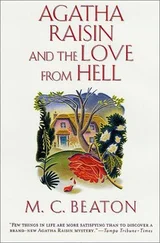Agatha wished she had brought a book or a newspaper to read on the train. There was something unsettling about being left with her own thoughts as the countryside slid by. She did not want to end her days alone. Perhaps when she decided she had enough money, she should start paying one of those high-class dating agencies or go on a cruise. Suddenly, the idea of a cruise filled her mind, an idea based on old movies where couples stood by the rail in the moonlight. She would get married and send James an invitation and see how he liked that! Damn James, she thought as the bubble of her dream burst.
She went straight to the office in Mircester, took the invitation to James’s engagement party and pinned it up on the noticeboard. Mrs. Freedman trotted over and read it. “Don’t dare say anything,” said Agatha. “Simply write out a reply and I’ll sign it. Where’s Toni?”
“She’s just phoned. She’s wrapped up a missing-teenager case and is on her way back in. Oh, here she is now. And there are some photographs on your desk. Phil said you asked for them.”
Agatha studied the photographs. There was a clear shot of Trixie leaving the vicarage, and then the photograph had been cropped to show just the head and shoulders.
“Toni,” Agatha hailed her. “I’ve got Trixie’s address from the marriage certificate. She used to live in Cheltenham. Get yourself a coffee while I look up the map and find out exactly where we’re going.”
Toni filled a mug from the coffee machine in the corner of the office. Then she saw the card pinned to the noticeboard. Her first thought was not about how Agatha might be taking the news of her ex’s engagement, but about how awkward it would be to see Harry again. Of course, he might not get an invitation. It was not as if he worked for the agency any more.
“Right,” said Agatha. “We’re off. We’ll take my car. Do you mind driving, Toni? I came straight from London and I’m feeling a bit tired.”
“Sure,” said Toni, reflecting that it was odd of Agatha to let her drive and then wondering for the first time just how badly Agatha was upset by that engagement invitation.
“This could be a wild-goose chase,” said Agatha, settling into the passenger seat and fastening her seat belt. “Maybe it’s because I really don’t like Trixie and I do want it to be her. But what motive could she possibly have?”
“Was that engagement invitation a surprise?” ventured Toni cautiously.
“A bit,” said Agatha gruffly.
After a while, Agatha fell asleep. Toni stopped the car and gently removed a smouldering cigarette from Agatha’s fingers, stubbed it out in the ashtray and then drove on.
Poor old thing, thought Toni. As she approached Cheltenham, she saw a police car driven by a young woman. It would be nice to work with young people for a change, thought Toni, because Agatha’s fifty-something years seemed very old to her.
She nudged Agatha. “Wake up! I need directions.”
“Eh, what? I wasn’t really asleep,” said Agatha defiantly. “Go in on the London Road and then cut up to Montpelier Terrace. Puddleton Close is up the back on the left.”
When they reached Montpelier Terrace, Agatha said, “Turn left here and then third on the right and then left again. It’s a cul-se-sac. Number four-A, which means it’s probably a basement flat. Oh, damn!”
“What?”
“Wait a minute while I phone Patrick. I’ll see if one of his old cop friends can check the police records under her name.”
Toni waited until Agatha had given Patrick his instructions and then asked, “So do we get out and start to question the neighbours?”
“No, I think I’d like to hear from Patrick first, and I’m hungry. The only food I got on the train was one ghastly little dried-up croissant. We’ll leave the car here. There’s an antique-gallery place near here with a cafe.”
Agatha ordered a bacon sandwich and coffee in the cafe. “I wish Patrick would hurry up,” she mumbled between bites.
“Might take all day,” Toni pointed out. “He’s got to find his friend first.”
“Well, we’ll give it another half an hour.”
Toni scowled into her cup of coffee.
“What’s bothering you?” asked Agatha. “Half an hour seems like too long?”
“No, I was thinking about sex.”
“At your age, that’s all anyone thinks about,” said Agatha.
“I don’t mean it the way you think I mean it. It all frightens me a bit.”
“You’re a virgin?”
“Yes, still. I got scared off.”
Agatha lit a cigarette, saw the horrified look the waitress gave her, remembered the smoking ban and sulkily stubbed it out in her saucer.
“Tell me about it.”
“It was in my final year at school,” said Toni. “There was this fellow. All the girls were mad for him and I was flattered when he asked me out on a date. We’d had a bit too much to drink at a club and then he led me down an alley at the back of the club and pushed me up against the wall and began to tear at my clothes. I screamed my head off, pushed him away and ran for my life.
“He put it about the school that I was a frigid lesbian and they all seemed to believe him until he was up in court on a charge of rape. I think I’m too romantic for sex.”
“The fact is,” said Agatha, “that women’s sexual freedom is less than it ever was.”
“What about the pill?”
“Oh, that’s all right. Saves a lot of unwanted children from being born. But now women are expected to perform all the tricks of the brothel, shave their pubic hair and go in for any nasty deviations the men want. That’s not freedom. That’s domination. But stick it out, Toni. You’re a pretty girl and bright. You’ll meet someone nice.”
Agatha’s phone rang. She scrambled in her handbag for her mobile. “Yes, Patrick,” Toni heard her say. Agatha listened intently, a smile spreading across her face. Finally she said, “That’s great work. Type it out and leave it on my desk in the office.” She rang off.
“Listen to this, Toni. Fifteen years ago, the saintly vicar’s wife was booked for possession and for supplying acid at the clubs. Why on earth she married a vicar, I’ll never know. Let’s go round to Puddleton Close and see what we can dig up.”
“It looks very upmarket,” said Toni as she parked once more outside 4-A.
“A lot of these places have been gentrified,” said Agatha. “Let’s see if there’s anyone at home.”
They walked down the stairs to the basement flat and rang the bell. The door was opened by a slim young man wearing jeans and an open-necked shirt. He had a shock of ginger hair and a pleasant face marred by acne scars.
Agatha explained they were private detectives trying to find out about a certain Trixie Webster who had lived in the flat fifteen years ago.
“No use asking me,” he said. “I only moved in a month ago and I think three sets of people lived here before me. Try old Mrs. Brother. She lives in the top flat and she’s lived there for yonks.”
Agatha thanked him. She and Toni climbed the stairs out of the basement and up to the main front door. Agatha rang the bell marked “Brother.” An elderly voice came over the intercom demanding to know who was there.
Agatha patiently explained her business. There was a long silence while she fretted on the doorstep, and then, to her relief, the door was buzzed open.
Mrs. Brother was waiting for them on the landing at the top of the stairs. She was stooped and wrinkled and seemed very old indeed, but her eyes were bright and sharp.
“Come in,” she said.
They entered a low-ceilinged, sunny room. Unlike most homes of the elderly, the room was neither over-furnished nor filled with photographs. There was a good landscape over the fireplace. A sofa and two comfortable chairs were covered in faded chintz facing a low coffee table. A Persian rug lay on the polished boards on the floor. There was a small polished round table with three upright chairs by the window holding a little crystal glass of wild flowers.
Читать дальше












